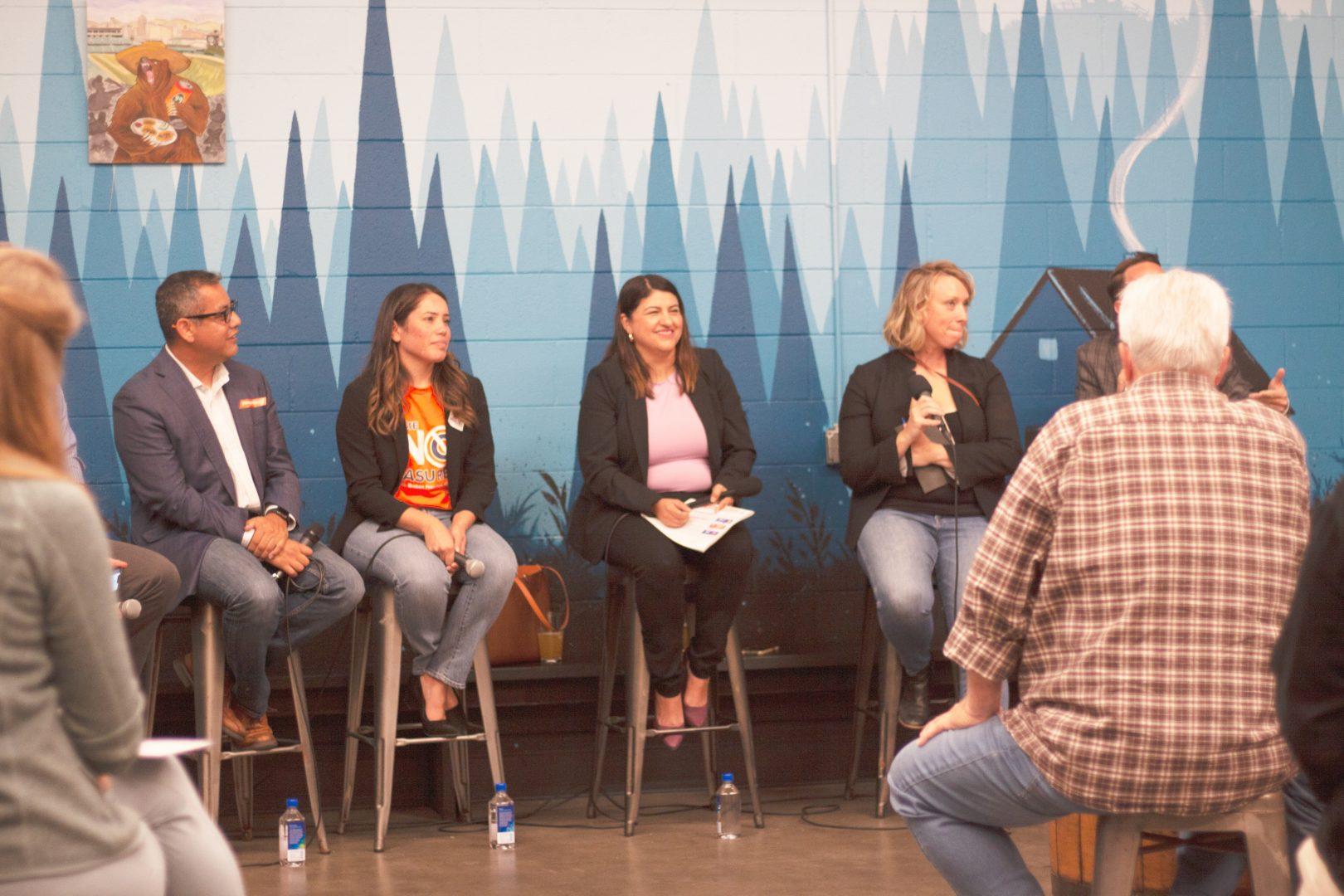The nonprofit newsroom Fresnoland invited the local community to discuss politics over Tioga-Sequoia Brewing Co. during its “Ballots and Brews” event in Downtown Fresno on Oct. 18.
The all-ages event was previously held in 2020 but was put on hold in the following years due to COVID-19, according to Isabel Santos-Gonzalez, Fresnoland’s communications manager. The return of the event packed the Lookout Room at Tioga-Sequoia, leaving many attendees standing in the outskirts of the room to listen to the panelists.
This year’s panelists, from community leaders and Fresno Council members, gathered to discuss local and state election topics, including the renewal proposal for Fresno County’s transportation sales tax, Measure C; a proposed countywide sales tax intended to improve Fresno State, Measure E; and the ethics of sports betting in propositions 26 and 27.
Fresnoland Executive Director Danielle Bergstrom moderated the event, asking questions to speakers Miguel Arias, Fresno’s District 3 council member; Neil Chase, CalMatters publisher; Veronica Garibay, co-founder of Leadership Counsel for Justice and Accountability; Aida Macedo, Fresno-based attorney and co-founder of Cid and Macedo, Inc.; and Clint Olivier, former Fresno City council member and executive director of Central Valley BizFed.
Bergstrom began by asking about the multiple tax measures on the ballot this year, particularly in the light of rising inflation.
“Everybody knows inflation is at a record high, and everybody anticipates a future recession. They all want to get the requests for more money before the economy takes a turn. The November ballot is that point in time,” Arias said.
Macedo agreed with Arias, saying the ballot doesn’t factor in the inflation currently affecting people with low incomes.
“Communities are really struggling to pay for everyday expenses,” Macedo said. “I think that having these ballot measures is not necessarily taking into account how the communities are hurting and the lack of oversight for these taxes.”
Arias said that having multiple tax measures on the ballot may discourage voters from voting yes on any of them, noting he himself intends to vote no on most. He also pointed out that even as a member of the Fresno State Alumni Board, he intends to vote no on Measure E.
“One person has put in [a million] to fund the Fresno State tax [Measure E]. That person happens to be a construction company owner that anticipates getting the construction contracts awarded to them,” Arias said.
Garibay transitioned the conversation to Measure C, which she argued community members were not involved enough in the process of creating the measure.
“How many of you in this room knew there were hand-picked committee members that were going to guide the renewal measures of Measure C in 2021? Nobody,” Garibay said.
She said that the 30-year renewal proposal failed to include the community despite directly impacting residents. According to Garibay, Measure C’s vast coverage makes it an “access to opportunity” issue, impacting how Fresno residents can navigate their city for work, school and more.
“You’re all voting in the election because we know how important it is for our democracy and for our community. But you all didn’t know and didn’t participate [in Measure C] because you weren’t invited into a space to decide how we should spend $7 billion that can be leveraged in multiple ways for state and federal funding,” she said.
The speakers then discussed online and in-person sports gambling in California.
Chase said opponents of propositions 26 and 27 are concerned about gambling addictions while proponents hope the taxes raised by the propositions can fund the homelessness crisis.
“What’s really mind-blowing about this proposition is the amount of money [being spent on it]. $400 million. You’ve seen it. The real lesson here is next election, own a TV station,” Chase said.
Chase criticized the amount of money in political ads for these propositions because the money could’ve been used for the same causes it claims to support, like homelessness.
The speakers also discussed the accessibility of the ballot and voters’ levels of engagement.
“I think as a news rights advocate, I think [the ballot] is very confusing for voters. Miguel and I were joking about how some of the ballot measures take up 20 pages in the sample ballot,” Macedo said.
Macedo argued that there’s not enough “safeguards and education” for voters to make informed decisions, leading to community organizers taking up the responsibility to conduct community outreach.
Olivier argued that these issues may stem from the lack of interest in voting among constituents.
“When I ran for city council, out of 100 eligible voters in District 7, 50 were registered to vote. Of the 50 who bothered to register to vote, 10 voted in the election that sent me to City Hall. Of those 10, six voted for me… Am I simply there because nobody cared enough to vote?” Olivier said.
However, many of the other speakers like Garibay and Arias disagreed with Oliver, saying it’s unfair to blame the voters. Despite the consensus agreement for many of these measures, the speakers did spend the remainder of its time debating opposing views like these.
The event concluded with speakers answering questions from the crowd while attendees were given information and stickers.
Those who missed the event can watch the recording on CMAC and YouTube.




